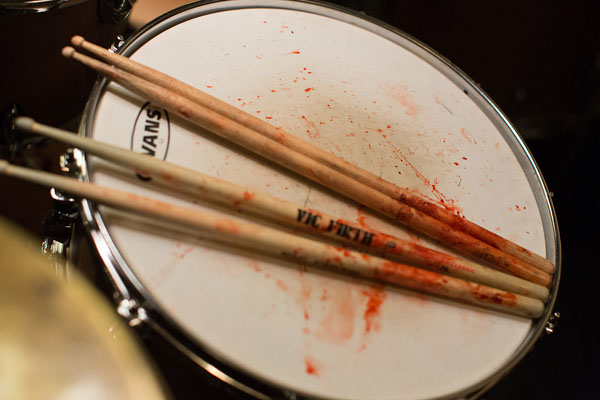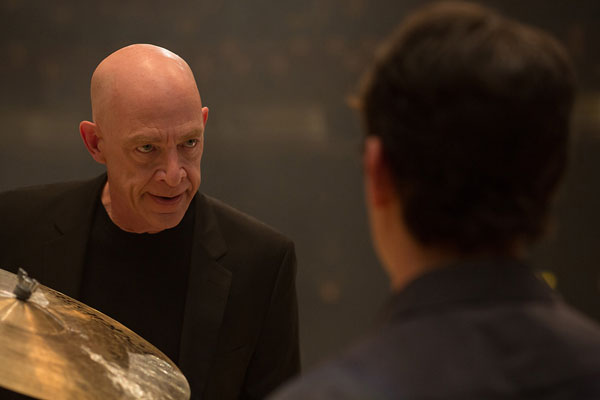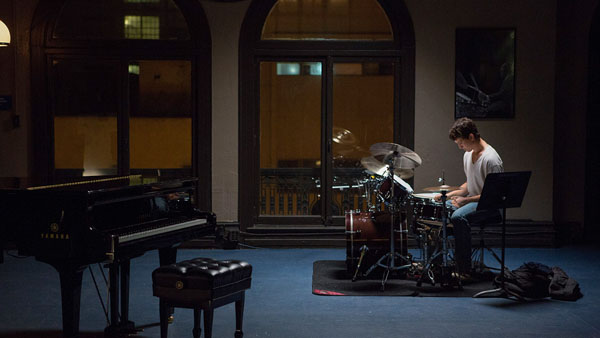“Back in 2009,” begins the Boston Globe‘s Ty Burr, “a young director named Damien Chazelle turned his little black-and-white Harvard student film into the talk of the Tribeca Film Festival. Guy and Madeline on a Park Bench was a no-budget Boston-set jazz musical shot in the style of a John Cassavetes movie; it shouldn’t have worked, but it did. There was real filmmaking talent there, too, but the whole thing felt like a lovely fluke. Who knew if we’d ever hear from the kid again?” Well, “at the opening night of the Sundance Film Festival, we heard from Damien Chazelle again. And it was the sound of an arrival.”
“The road to excellence is littered with bloody Band-Aids, splintered drum sticks and daddy issues in writer-director Damian Chazelle’s lively study of musical obsession,” writes the Guardian‘s Henry Barnes. “J.K. Simmons plays Terrence Fletcher, a jazz band leader at a top flight New York conservatoire. Miles Teller is Andrew, a gifted drummer dragged into Fletcher’s inner circle/boxing ring. Fletcher believes in beating the talent out of his pupils. He slaps them in time to the beat… Andrew and Fletcher’s relationship is sado-masochistic, but its never melodramatic. Chazelle looks to be rat-a-tat-tatting his way into Black Swan territory at one point, until he hauls the film back down to a calmer tempo, in preparation for the hell-rattling drum roll of the last 15 minutes.”
With Whiplash, “Chazelle proves an exceptional builder of scenes, crafting loaded, need-to-succeed moments that grab our attention and hold it tight,” writes Variety‘s Peter Debruge.
“Teller, who greatly impressed in last year’s Sundance entry The Spectacular Now, does so again in a performance that is more often simmering than volatile,” writes Todd McCarthy in the Hollywood Reporter. “For his part, Simmons has the great good fortune for a character actor to have here found a co-lead part he can really run with, which is what he excitingly does with a man who is profane, way out of bounds and, like many a good villain, utterly compelling.”
Interviews with Chazelle: Michael Dunaway (Paste), Filmmaker and Indiewire. Variety‘s Dave McNary reports that Sony Pictures Worldwide Acquisitions “has acquired rights to most key international territories.”
Updates, 1/19: “The quest to be the best is a familiar film story,” writes James Rocchi at the Playlist, “but if director-writer Chazelle has achieved anything here, it’s a deeply and richly different take on that journey—not only examining the cost of struggle but the reward of it, showing both what it takes to be great and what happens when you don’t have it. Chazelle is aided in this immeasurably by his actors. Miles Teller is, at this point, the best young male actor in America—possessed of both natural charisma and impeccable technique, his guy-next-door looks masking a singular intensity.”
“Imagine a cross between a David Mamet play and a violent UFC bout restaged in a music conservatory,” writes David Fear for Esquire. “You’re halfway there…. If you remember that Simmons played a Nazi convict on the HBO show Oz long before he started stumping for Farmer’s Insurance, you might not be surprised by the sheer vitriol he brings to the role. But the imposing actor attains Glengarry Glen Ross levels of glorious alpha-douchebaggery here.”
“What haunted me about Whiplash is the fantastic ambivalence that’s built into the film’s vision of Fletcher,” writes EW‘s Owen Gleiberman. “He may be a monster, but he’s a monster who lives for beauty—he wants to drive a kid like Neiman into becoming an artist like Charlie Parker, and he thinks that the only way to do it is to bully the poor kid into greatness. He may be wrong, but he’s also right.”
“Some have already called the film’s romantic subplot a distraction, but in a sense, it’s supposed to be,” suggests the AV Club‘s A.A. Dowd. “For Andrew, happiness and greatness may be mutually exclusive; to achieve his potential, to make it into the pantheon, he has strip his life down to nothing but effort and rhythm…. In its astounding final stretch, Whiplash begins to look like a bona fide creation myth, one destined to blow the minds of John Bonham fans everywhere. Cinephiles are witnessing a breakthrough, too: Syncing his newfound formal chops—his surgical editing, his gift for filming musicians at work—to the pulse of his driven hero, Chazelle pays off his own potential in a big way.”
For the Dissolve‘s Nathan Rabin, “what begins as an extreme mismatch—the scared kid vs. the scariest teacher in the world—eventually develops into a riveting war of wills that closes with a thundering climax, which goes a long way toward justifying the film’s enormous, richly merited buzz.”
And for Time Out‘s Joshua Rothkopf, “there’s also unusual, spiky attention paid to the pursuit of excellence, as Andrew begins to resent the mediocre achievements of his family. By film’s end, he’s an arrogant, cymbal-smashing machine. How breathtaking it is to see a story go there. The identity this teen chases after is a lonely one, but it’s impeccably on the beat.”
Tim Grierson for Paste: “Without ever making it explicit, Whiplash asks what provokes greatness—Firmness? Unconditional encouragement? Letting it flower on its own?—and whether the demands that go into becoming the best are actually worth it. Chazelle wrestles with these questions through his two combatants, allowing for an uncertain, festering friction between these men. It’s too bad, then, that the finale opts for a too-clean outcome to such lingering uncertainties.”
“Whiplash delivers an energy you’re lucky to feel once or twice on the big screen each year,” writes Erik Davis at Movies.com, punctuating his review with clips of famous drum solos. More from Ryland Aldrich (Twitch), Emma Myers (Indiewire, A-), Matt Patches (Vanity Fair), Anne Thompson and Amber Wilkinson (Telegraph). EW‘s Jeff Labrecque talks with Chazelle and Logan Hill interviews Teller for Rolling Stone.
Viewing (4’06”). Chazelle, Teller, Paul Reiser, Melissa Benoist and Auston Stowell talk to EW. More viewing (16’42”). Same gang, but over at HitFix. Yet more viewing (16’24”). Anne Thompson talks with Teller.
And finally for now, following the pickup of international rights by Sony Pictures Worldwide, Sony Pictures Classics has taken domestic rights. Andrew Stewart reports for Variety.
Updates, 1/21: A Film.com score of 8.5/10 from Eric D. Snider, who notes that “crucially, while Whiplash isn’t a syrupy Mr. Holland’s Opus, it’s not a raunchy Bad Teacher or Role Models, either.”
Jada Yuan talks with Teller for Vulture.
Updates, 1/31: “Whiplash isn’t totally convincing,” finds Wesley Morris at Grantland. “This is a jazz movie about two white guys who love jazz, psychotically. A friend called the film race agnostic. Chazelle probably just cast the two best people for the part, and they’re both great (Teller plays his own instrument). But you’re not unaware of all the black men in the band just standing around while Teller and Simmons act all over each other. But enthusiasm for this movie feels involuntary. Chazelle taps your knee and your leg flies up.”
Salon‘s Andrew O’Hehir: “Chazelle wants to ask us is not an easy one to answer: Is some of that domination and deconstruction necessary if we want to train great drummers, great dancers, great doctors and great engineers?” At any rate, “this a movie to put on your calendar, one that marks the emergence of a remarkable young American director and the breakout performance of a great American actor who’s been with us for decades.”
Manohla Dargis in the New York Times: “The movie was soon christened Full Metal Juilliard, but it’s deeper and richer than its nickname suggests.”
“Whiplash’s journey to Sundance is a crazy story unto itself,” notes Marlow Stern at the Daily Beast. “The film was shot over 19 days, wrapping on Oct. 11 of last year. Chazelle and Tom Cross quickly edited the movie—the yellow-hued film looks stunning, and the plethora of shots and angles are beautifully composed—and submitted it to Sundance on Nov. 8, thanks to an extended deadline (and, presumably, executive producer Jason Reitman). It was accepted two weeks later.” And as we know now, it’s won both the Grand Jury Prize (Dramatic) and the Dramatic Audience Award.
Eugene Hernandez talks with Chazelle on the Daily Buzz.
Update, 5/22: “For all that Whiplash boasts technically impressive live performance adrenaline highs, which effectively capture the thrill of watching a group of musicians play in total harmony, it is too often guilty of distracting its audience from its self-conflicting message.” Adam Woodward lays out his argument at Little White Lies.
Cannes 2014 Index. For news and tips throughout the day every day, follow @KeyframeDaily on Twitter and/or the RSS feed. Get Keyframe Daily in your inbox by signing in at fandor.com/daily.







